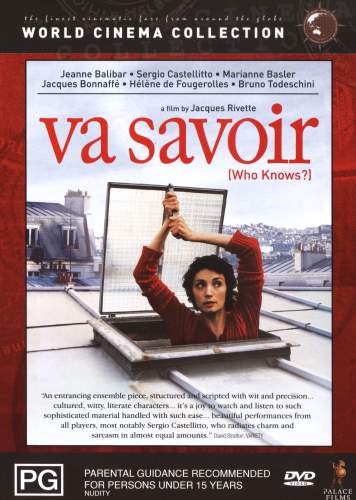Va Savoir (2001) |
|
Va Savoir (2001) |
|


|
| BUY IT |
| General | Extras | ||
| Category | Drama |
Interviews-Cast-Jeanne Balibar (Actor) Featurette-Co-Writers Discuss Va Savoir Theatrical Trailer-2 Biographies-Cast & Crew Gallery-Photo-8 |
|
| Rating |

|
||
| Year Of Production | 2001 | ||
| Running Time | 147:44 (Case: 154) | ||
| RSDL / Flipper | RSDL (113:37) | Cast & Crew | |
| Start Up | Menu | ||
| Region Coding | 2,4 | Directed By | Jacques Rivette |
|
Studio
Distributor |
 Twentieth Century Fox |
Starring |
Jeanne Balibar Marianne Basler Hélène de Fougerolles Catherine Rouvel Sergio Castellitto Jacques Bonnaffé Bruno Todeschini Claude Berri Attilio Cucari Bettina Kee Luciana Castellucci Emanuele Vacca Arturo Armone Caruso |
| Case | ? | ||
| RPI | $36.95 | Music |
Gino Paoli Alec Wilder |
| Video | Audio | ||
| Pan & Scan/Full Frame | None | French Dolby Digital 2.0 (224Kb/s) | |
| Widescreen Aspect Ratio | 1.85:1 | ||
| 16x9 Enhancement |
 |
||
| Video Format | 576i (PAL) | ||
| Original Aspect Ratio | 1.85:1 | Miscellaneous | |
| Jacket Pictures | No | ||
| Subtitles | English | Smoking | Yes |
| Annoying Product Placement | No | ||
| Action In or After Credits | No | ||
If you come away thinking that this was a l-o-n-g movie - take heart - the original version was over 3 hours long!! Perhaps it was also served an injustice by its promotion as a comic film. It's not really - it's better described as a farcical drama - it explores how ludicrous our life situations can become by contrasting them against the "saner" world of live theatre.
Our main character, Camille (Jeanne Balibar) is an actress returning with an Italian troupe to Paris after an absence of three years. We see her extreme anxiety as she returns, and soon learn its source is the possibility that she may remeet her lover, Pierre (Jacques Bonnaffé). Although Camille has since taken up with the troupe manager, Ugo (played by the wonderful Sergio Castellitto), she is still deeply conflicted about her past affair, and obviously feels that there is some water to pass under that bridge. In order to confront her demons, she goes to Pierre's house, only to be greeted by his new partner, Sonia (Marianne Basler). Fleeing from the apartment, she finds that Pierre is still a creature of his habits, and she meets with him at his usual bench in the park. He invites Camille and Ugo to dinner, and in a fierce attempt at demonstrating her freedom from him, she accepts.
Meantime, Camille is not the only servant to passions from the past. Ugo has been tipped off that the celebrated playwright Goldoni wrote a play for a Parisian friend by way of paying a debt. No one has ever seen this play or confirmed evidence that it exists, but Ugo is determined to try to track it down and make history by performing it. He is assisted by a charming young history student named Dominique, or Do (the exquisite Hélène de Fougerolles) who, as it transpires, has a library of antiquities at her home. Also lurking at Do's home, amidst the dusty books and the eternal cakes made by her mother, is her mysterious and nefarious step-brother Arthur (Bruno Todeschini), an altogether suspicious piece of work, forever in need of money and with a very questionable past.
From here, as they say, the plot thickens, with outrageously overlapping stories revealing all manner of secret and clandestine connections between our players. Sonia, it transpires, knows something more of Arthur than would immediately meet the eye, and for all her good manners and grace, apparently has a less than salubrious past.
Interspersed through all these "real life" complications, the film frequently cuts to the performance of the Italian company's play, where Ugo and Camille can be seen performing in Come Tu Mi Vuoi (which can be loosely translated as "As You Want Me To Be"). The title is more than a little ironic, as our "real life" performers are all struggling with the balance between identity and expectation. The complications slowly build into a farcical crescendo, where their antics and decisions put them all onto the stage of the theatre to play out their private denouements.
Although the film did play out slowly and seemed to make much of very little, there was still a strangely hypnotic quality to the piece. Occasionally, one had to suppress the urge to slap the main characters for their stupidity and self-absorption, but still one found oneself interested in how they would resolve their individual dilemmas. Overall, a satisfying experience, but only if you're in the mood for a more languorous piece of viewing.
The transfer is presented in an aspect ratio of 1.85:1, 16x9 enhanced.
This film suffers from a pretty ordinary transfer, with a very dull and lifeless print. The first 35 minutes or so are in low light conditions in interior shots, and the lack of contrast or luminance makes this pretty ordinary travelling. Low level noise is present and shadow detail is poor, which culminates in a very frustrating and somewhat off-putting experience in watching this film.
When the action was outdoors in daylight, the colours absolutely popped off the screen. Unfortunately, that accounts for about 10 minutes of this 147 minute film, so the rest is a bit of a struggle. Everything felt a little soft overall, and this masque affected the colour palette as well.
The softness of the print was made even worse by compression problems that resulted in incidents of macro blocking and a very nondimensional result. Sharpness was a problem throughout and aliasing was frequently present.
Subtitles were clean, clear and easy to understand.
This disc is an RSDL disc, with the layer change placed at 113:37. It is not particularly disruptive to the flow of the film.
| Sharpness | |
| Shadow Detail | |
| Colour | |
| Grain/Pixelization | |
| Film-To-Video Artefacts | |
| Film Artefacts | |
| Overall |
There is one audio track - French Dolby Digital 2.0.
Dialogue quality was not too bad, although occasionally it became a little shrill. Audio sync presented no challenges at all.
There is virtually no musical score to discuss with this film. Aside from incidental music, most ambient sound was exactly that - ambient; creaking floorboards, slamming doors - all the stuff of theatre really - which perhaps was veteran film maker Jacques Rivette's intention.
The surround channels were unused, although occasionally there was just a hint of subwoofer - nothing ever particularly ground breaking, but it was occasionally there.
| Dialogue | |
| Audio Sync | |
| Clicks/Pops/Dropouts | |
| Surround Channel Use | |
| Subwoofer | |
| Overall |
The menu was static and easy to navigate.
Both the US and the French trailer exist here at 1:43 and 1:24 respectively.
(8:12) Balibar sits in a noisy café and discusses her role and her involvement with the project. Quite interesting, and actually helpful in getting a handle on the character Camille.
The two writers discuss an abbreviated version of the film. Interesting because we occasionally see the writers in front of their microphones, and also because it becomes apparent that they rarely agreed on the script.
Brief biographies on Jeanne Balibar, Sergio Castellitto, Marianne Basler, Hélène de Fougerolles and Jacques Rivette.
NOTE: To view non-R4 releases, your equipment needs to be multi-zone compatible and usually also NTSC compatible.
The Region 4 version of this disc misses out on:
The Region 1 version of this disc misses out on:
Both films are the "shorter" version, so R4 is the winner.
It takes a long time to get there, but in the end, the journey's sort of worth it. Not one of Rivette's best films, but entertaining in a very French way. Some will loathe it, for others it will quietly amuse.
| Video | |
| Audio | |
| Extras | |
| Plot | |
| Overall |
| Review Equipment | |
| DVD | Singer SGD-001, using S-Video output |
| Display | Teac 76cm Widescreen. Calibrated with Video Essentials. This display device is 16x9 capable. |
| Audio Decoder | Built in to amplifier/receiver. Calibrated with Video Essentials. |
| Amplification | Teac 5.1 integrated system |
| Speakers | Teac 5.1 integrated system |